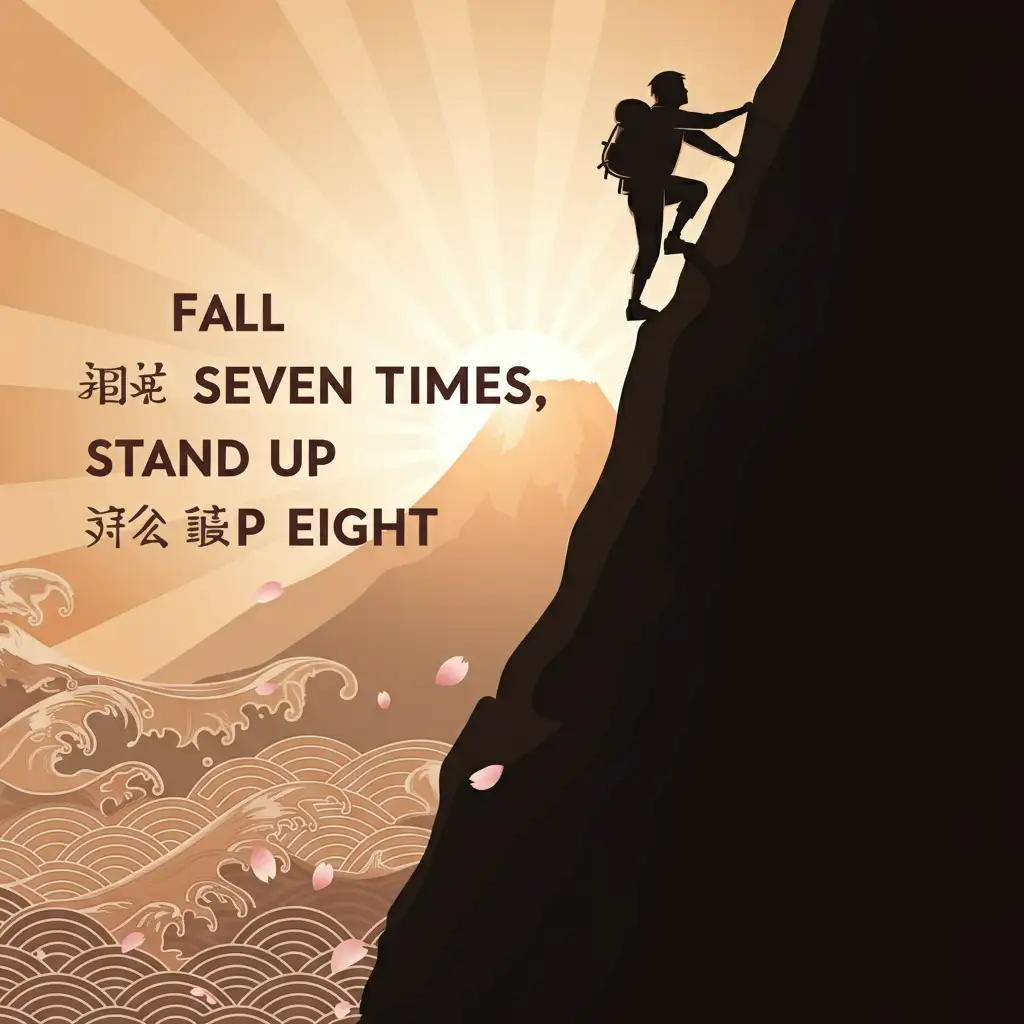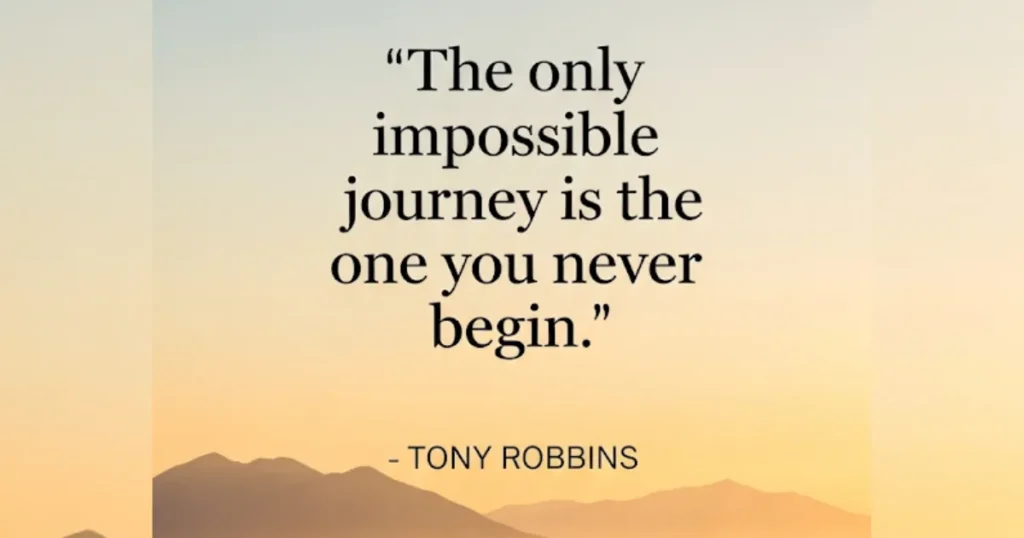Picture this: You’ve just faced your biggest career setback, your relationship ended, or your business failed. Your first instinct might be to hide under the covers and give up. But what if I told you that every failure is actually setting you up for something greater? The ancient Japanese proverb “fall seven times and stand up eight” teaches us that resilience isn’t just about bouncing back—it’s about becoming stronger with every challenge you face.
This powerful saying, known as “Nana korobi ya oki” in Japanese, has guided millions through life’s toughest moments. When you truly understand what it means to fall seven times and stand up eight, you unlock a mindset that transforms obstacles into opportunities and setbacks into comebacks.

The Deep Meaning Behind “Fall Seven Times and Stand Up Eight”
What This Japanese Proverb Really Teaches Us
At its core, this wisdom isn’t just about recovering from failure. The proverb “fall seven times and stand up eight” reveals a profound truth: resilience is a choice, not a circumstance.
Notice the math here—if you fall seven times, you only need to get up seven times to be even. But standing up eight times means you’re always one step ahead of your failures. You’re not just surviving; you’re thriving.
This ancient wisdom teaches us that:
- Failure is temporary, but giving up is permanent
- Every setback contains the seeds of a comeback
- Your response to adversity defines your character
- Resilience grows stronger with practice
The Cultural Wisdom of Japanese Philosophy
Japanese culture deeply values perseverance and continuous improvement, concepts known as “kaizen” and “ganbaru.” When you embrace the mindset to fall seven times and stand up eight, you’re tapping into centuries of wisdom about human potential.
This isn’t just positive thinking—it’s a practical philosophy for navigating life’s inevitable challenges. The Japanese understand that strength comes not from avoiding difficulties, but from facing them head-on and learning from each experience.
Real-Life Applications: How to Fall Seven Times and Stand Up Eight
Career Setbacks and Professional Growth
Think about the most successful people you know. They didn’t get there by avoiding failure—they got there by mastering the art of recovery. When you face job rejection, career setbacks, or business failures, remember that each “fall” is data for your next success.
Here’s how to apply this wisdom professionally:
- Reframe rejection as redirection: Every “no” brings you closer to the right opportunity
- Document your lessons: Write down what you learn from each setback
- Network through adversity: Use challenging times to build meaningful connections
- Skill up during downtime: Transform periods of uncertainty into growth opportunities
Consider Sara Blakely, founder of Spanx, who was rejected by countless manufacturers before finding success. She literally had to fall seven times and stand up eight in her journey to becoming a billionaire entrepreneur.
Relationships and Personal Challenges
The principle of fall seven times and stand up eight applies powerfully to personal relationships. Whether you’re dealing with heartbreak, family conflicts, or friendship challenges, resilience helps you grow stronger and wiser.
Relationship resilience looks like:
- Learning from past relationships instead of avoiding future ones
- Setting healthier boundaries after being hurt
- Communicating better after misunderstandings
- Growing your emotional intelligence through difficult experiences
Health and Wellness Journey
Your wellness journey will have ups and downs. You might fall off your diet, skip workouts, or struggle with mental health. The key is to fall seven times and stand up eight—to keep returning to healthy habits despite temporary setbacks.
Practical wellness resilience includes:
- Starting fresh after unhealthy choices without guilt
- Viewing setbacks as part of the process, not personal failures
- Building sustainable habits that accommodate life’s challenges
- Celebrating small wins while working toward bigger goals
Building Your “Stand Up Eight” Mindset
Developing Unshakeable Resilience
Resilience isn’t something you’re born with—it’s a skill you develop. When you commit to fall seven times and stand up eight, you’re training your mind to see possibilities where others see problems.
Step 1: Change Your Internal Dialogue
Replace “I failed” with “I learned.” Replace “I can’t do this” with “I can’t do this yet.” These small shifts in language create massive shifts in mindset.
Step 2: Create Your Recovery Ritual
Develop a specific process for bouncing back from setbacks:
- Acknowledge the disappointment without dwelling on it
- Extract three lessons from the experience
- Identify one immediate action you can take
- Visualize your comeback story
Step 3: Build Your Support Network
Surround yourself with people who believe in the power to fall seven times and stand up eight. Share your struggles with trusted friends, mentors, or coaches who can offer perspective and encouragement.
The Science Behind Resilient Thinking
Research shows that resilient people share common traits: they view challenges as opportunities, maintain an optimistic outlook, and believe in their ability to influence outcomes. When you practice the philosophy of fall seven times and stand up eight, you’re literally rewiring your brain for success.
Neuroplasticity research demonstrates that repeated positive responses to adversity strengthen neural pathways associated with resilience. Each time you choose to get back up, you make it easier to get up the next time.
Transforming Failure into Fuel for Success
Why Your Setbacks Are Actually Setups
Every person who has achieved something meaningful has a story of falling seven times and standing up eight. Michael Jordan was cut from his high school basketball team. Oprah Winfrey was fired from her first television job. Colonel Sanders was rejected 1,009 times before someone agreed to use his chicken recipe.
Your failures aren’t roadblocks—they’re stepping stones. Each setback teaches you something you couldn’t learn any other way:
- Resilience under pressure: How to keep going when things get tough
- Creative problem-solving: How to find new paths when the obvious ones are blocked
- Emotional intelligence: How to manage your emotions during difficult times
- Authentic confidence: Confidence built on overcoming real challenges, not just positive thinking
The Compound Effect of Getting Back Up
When you consistently fall seven times and stand up eight, something magical happens. Your capacity for handling challenges grows exponentially. What once seemed impossible becomes manageable. What once felt overwhelming becomes just another obstacle to overcome.
This compound effect creates:
- Increased tolerance for uncertainty
- Better decision-making under pressure
- Stronger emotional regulation
- More creative problem-solving abilities
- Greater overall life satisfaction
Daily Practices to Live This Philosophy
Morning Resilience Rituals
Start each day by affirming your commitment to fall seven times and stand up eight. This isn’t just positive thinking—it’s mental preparation for the challenges you’ll inevitably face.
Your Daily Resilience Practice:
- Gratitude for Growth: Write down one challenge from yesterday that taught you something valuable
- Intention Setting: Identify one area where you’re committed to persevering despite difficulties
- Visualization: Picture yourself handling today’s challenges with grace and determination
- Affirmation: Remind yourself that setbacks are setups for comebacks
Evening Reflection Questions
End each day by reflecting on how you lived the principle of fall seven times and stand up eight:
- What challenges did I face today, and how did I respond?
- What did I learn from any setbacks or disappointments?
- How can I apply this wisdom to tomorrow’s challenges?
- What evidence do I have of my growing resilience?
Related Wisdom to Fuel Your Journey
As you embrace the power to fall seven times and stand up eight, consider these complementary pieces of wisdom:
“The bamboo that bends is stronger than the oak that resists.” – Japanese Proverb
This reminds us that flexibility and adaptability are forms of strength, not weakness.
“Success is not final, failure is not fatal: it is the courage to continue that counts.” – Winston Churchill
Your current situation is not your final destination.
“I have not failed. I’ve just found 10,000 ways that won’t work.” – Thomas Edison
Every “failure” is actually valuable data for your eventual success.
Your Next Step: Standing Up for the Eighth Time
Now that you understand the transformative power of this ancient wisdom, it’s time to take action. Think about one area of your life where you’ve been knocked down and haven’t fully gotten back up. Maybe it’s a career goal you abandoned, a relationship you’ve been afraid to pursue, or a dream you put on hold.
Today is your eighth time standing up.
Remember, you don’t have to have all the answers or feel completely ready. You just have to be willing to try again. The Japanese proverb “fall seven times and stand up eight” isn’t about perfection—it’s about persistence.
Start small. Take one action today that moves you toward your goal, even if it feels scary or uncertain. Share this wisdom with someone who needs to hear it. Write down your comeback story and start living it.
Your eight time standing up begins now. What will you choose to do with this moment? The world is waiting to see what you’re truly capable of when you refuse to stay down.
Ready to transform your setbacks into comebacks? Share this article with someone who needs to hear about the power to fall seven times and stand up eight. Your story of resilience might be exactly what they need to get back up.


